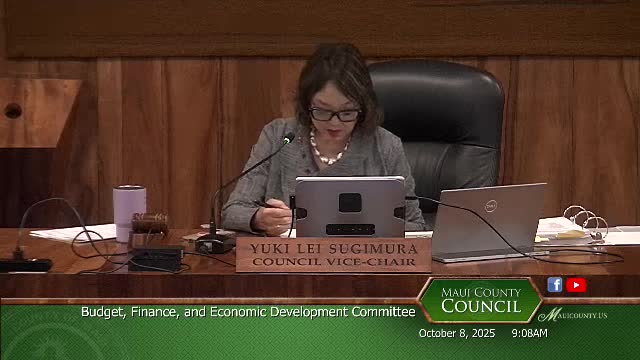Committee advances $20 million West Maui land purchase to clear way for flood-control, road projects
Get AI-powered insights, summaries, and transcripts
Subscribe
Summary
The Budget, Finance & Economic Development Committee voted to recommend first reading of bills and a resolution authorizing a $20 million county purchase of West Maui parcels intended to secure land for Lahaina flood‑control and road projects.
The Budget, Finance & Economic Development Committee voted to recommend first reading of three bills and a related resolution that would authorize a $20 million county purchase of parcels in West Maui intended to support flood-control work and road extensions for Lahaina.
The committee, chaired by Yuki Lehi Sugimura, considered maps and a 330‑page title report and spent extensive time on 18 parcels identified by staff as lacking insurable ("clouded") title. Jordan Molina, director of Public Works, told the committee the county and seller negotiated from earlier, higher asking figures and "settled on this $20,000,000 number," which he said aligns with county property tax valuations and would let the county control land needed for the flood and road projects.
Why it matters: County officials said acquiring the contiguous acreage now would allow the administration to deliver a federal‑funded flood‑control project, expand road connections for evacuation and access, and manage land swaps or relocations (including a potential Salvation Army relocation and an expansion for Kalea Ola). Several members and staff warned that the 18 parcels with title issues must be resolved before closing and that some parcels likely would not be covered by title insurance.
Most important facts first: The administration recommends buying the full parcel package to secure alignments for the Lahaina flood‑control channel and Kuhua/Kahua Street extensions, which staff say are necessary to make use of NRCS (Natural Resources Conservation Service) design and construction funding and fit within a fast timeline for CDBG‑DR (HUD Community Development Block Grant — Disaster Recovery) infrastructure spending.
Title and closing costs: Committee members asked whether clouded parcels could later expose the county to litigation or additional expense. Nancy Zhao, deputy corporation counsel, summarized staff review and said the team will continue to work on encumbrances before closing. She also explained that the title company typically will provide insurance only for parcels with clear title and "with regards to the 18 that have clouded title, they would not be providing title insurance. That's my understanding," which the committee recorded as a material risk to be addressed before or during closing.
On closing costs, a staff finance adviser (Mr. Hironaka) reported an estimate: "on a $20,000,000 deal, it's gonna cost us approximately $11,000 for escrow, the closing costs. The estimated title insurance is about 8,600, so we're looking about 20,000." The advisor said bulk purchase limits those fees compared with buying each lot separately, when minimum charges and hundreds of individual policies would increase costs.
Engineering, flood modeling and safety: Public Works staff said the NRCS channel design is being modeled to the 100‑year storm standard and that changes to channel alignment tied to other landowners (including Kamehameha Schools) have altered the footprint of the planned flood channel. Jordan Molina said the redesigned channel is intended to be deeper and narrower than the existing channel, which has a larger footprint; several council members urged multiple engineering reviews before construction because of public‑safety concerns.
Funding and schedule constraints: Office of Recovery staff told the committee CDBG‑DR funds could pay for eligible housing, park, or service uses on acquired land but that the county is operating under a limited (approximately six‑year) federal spending window for those disaster‑recovery funds. Staff said acquiring the land would make the county eligible to proceed with design and environmental work needed to keep federal infrastructure funding on schedule.
Water and wells: Committee members asked about water availability. Deputy director Landgraf and finance staff said the land acquisition as proposed does not include ownership of all existing wells; sellers are reserving well‑site easements for some facilities while granting non‑exclusive transmission‑line easements. Committee members were told the skimming wells were not included in the purchase and that staff estimated a rough daily yield of about 1 million gallons for the nearby water infrastructure, which would require separate negotiation and technical review before any water allocations were promised.
Next steps and vote: Committee counsel and staff said they would continue to examine the title report's exceptions and encumbrances and work to resolve issues before closing. The committee voted to recommend passage on first reading of the bills and adoption of the resolution; the chair called the voice/hand vote and the clerk recorded the motion as passing in committee with six yes votes and three members excused. The administration said it will provide the committee the 2016 environmental assessment and other exhibits for review before first reading.
The motion advances the purchase to the council's legislative process but leaves multiple implementation steps open: clearing clouded titles, completing environmental reviews for specific projects, confirming which parcels (and any wells) are included, and meeting federal funding timelines.
Ending: The committee approved forwarding the legislation to the full council to allow the county to secure parcels needed to progress flood‑control and road projects in West Maui. Council and staff said they will return to the committee with additional title‑clearing work, environmental analyses and schedule details before final reading and closing.
